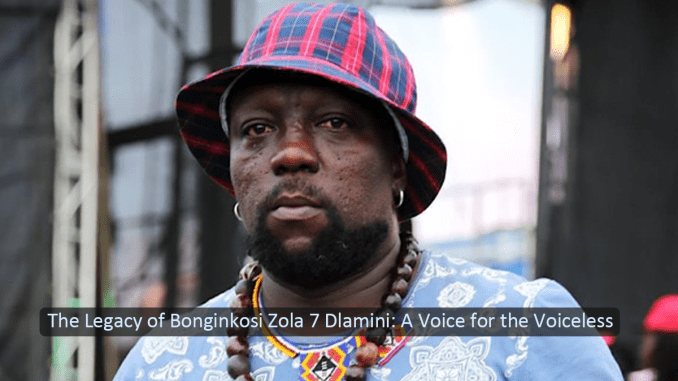
The Legacy of Bonginkosi Zola 7 Dlamini: A Voice for the Voiceless.
Explore the life and impact of Bonginkosi Zola 7 Dlamini, a powerful advocate for the voiceless. Learn about his music, activism, and the lasting mark he left on South Africa.
Bonginkosi Zola 7 Dlamini was a prominent figure in South Africa, known for his music and activism. He used his platform to advocate for the voiceless and address social issues in his country. Through his music, he touched the hearts of many and left a lasting mark on South Africa.
Early Life and Musical Career
Bonginkosi Zola 7 Dlamini, also known as Zola, was born on April 24, 1977, in Soweto, South Africa. He grew up in a challenging environment, witnessing the struggles and injustices faced by his community. Music became an outlet for him to express his thoughts and emotions.
Zola’s musical career began in the late 1990s when he joined the Kwaito group, Trompies. Kwaito is a genre of music that originated in South Africa and combines elements of hip hop, house music, and traditional African rhythms. Zola’s unique style and powerful lyrics quickly gained attention, and he soon became a solo artist.
His debut album, “Umdlwembe,” was released in 2000 and was a massive success. The album addressed social issues such as poverty, crime, and inequality, resonating with many South Africans who were facing similar challenges. Zola’s music became a voice for the voiceless, shining a light on the struggles of the marginalized communities.

Throughout his career, Zola continued to release albums and collaborate with other artists, further solidifying his status as a prominent figure in South African music. His songs often carried powerful messages, urging listeners to stand up against injustice and fight for a better future.
In addition to his music, Zola was also involved in activism and community work. He used his platform to raise awareness about social issues and worked towards creating positive change in his country. Zola’s dedication to his community and his passion for making a difference made him a beloved figure in South Africa.
READ ALSO: The Rise of Ishmauel Songo aka Sabelo: From Unknown Actor to Rhythm City Star
Tragically, Bonginkosi Zola 7 Dlamini passed away on February 16, 2021, leaving behind a legacy of music, activism, and a commitment to giving a voice to the voiceless. His impact on South Africa and the world will always be remembered, and his music will continue to inspire and empower generations to come.
Activism and Social Justice Work
Bonginkosi Zola 7 Dlamini, also known as Zola, was not only a talented musician but also a dedicated activist and advocate for social justice. Throughout his career, he used his platform to raise awareness about the struggles and injustices faced by marginalized communities in South Africa.
Zola was actively involved in community work, working towards creating positive change in his country. He used his voice and influence to shed light on social issues such as poverty, crime, and inequality, urging listeners to stand up against injustice and fight for a better future.
His commitment to activism and social justice made him a beloved figure in South Africa, and his impact on the country and the world will always be remembered. Zola’s legacy serves as a reminder of the power of music and activism in bringing about meaningful change and giving a voice to the voiceless.
Impact on South African Society
Bonginkosi Zola 7 Dlamini, also known as Zola, had a profound impact on South African society. Through his music and activism, he brought attention to the struggles and injustices faced by marginalized communities in the country. Zola’s powerful lyrics and passionate performances resonated with people from all walks of life, inspiring them to take action and fight for social justice.
READ ALSO: The Qwabe Twins: Breaking Barriers in the Music Industry
His songs addressed issues such as poverty, crime, and inequality, shining a light on the harsh realities faced by many South Africans. Zola’s music became an anthem for those who felt unheard and marginalized, giving them a voice and a sense of empowerment.
Beyond his music, Zola was actively involved in community work and social initiatives. He dedicated his time and resources to projects aimed at improving the lives of those in need. His commitment to creating positive change in his country made him a beloved figure and a role model for many.
Zola’s impact on South African society continues to be felt even after his passing. His legacy serves as a reminder of the power of art and activism in bringing about meaningful change. He will always be remembered as a voice for the voiceless and a champion for social justice in South Africa.
Legacy and Influence
Bonginkosi Zola 7 Dlamini’s legacy and influence are undeniable. His music and activism continue to inspire and empower people, particularly those who have been marginalized and silenced. Zola’s commitment to addressing social issues and fighting for justice has left a lasting impact on South African society.
His songs remain anthems for those who feel unheard, and his dedication to community work serves as a model for others. Zola’s legacy is a reminder of the power of using art and activism to create positive change and advocate for the voiceless.
Remembering Bonginkosi Zola 7 Dlamini
Bonginkosi Zola 7 Dlamini, also known as Zola, was a remarkable individual who used his voice and platform to advocate for the voiceless. Through his music and activism, he addressed social issues and fought for justice in South Africa. Zola’s impact can still be felt today, as his songs continue to inspire and empower those who have been marginalized and silenced.
READ ALSO: The Untold Story of Joseph Tshepo Senatle aka Koloi from Skeem Saam
His dedication to community work serves as a model for others, reminding us of the power of using art and activism to create positive change. As we remember Bonginkosi Zola 7 Dlamini, we honor his legacy and the lasting mark he left on South African society.

Leave a Reply